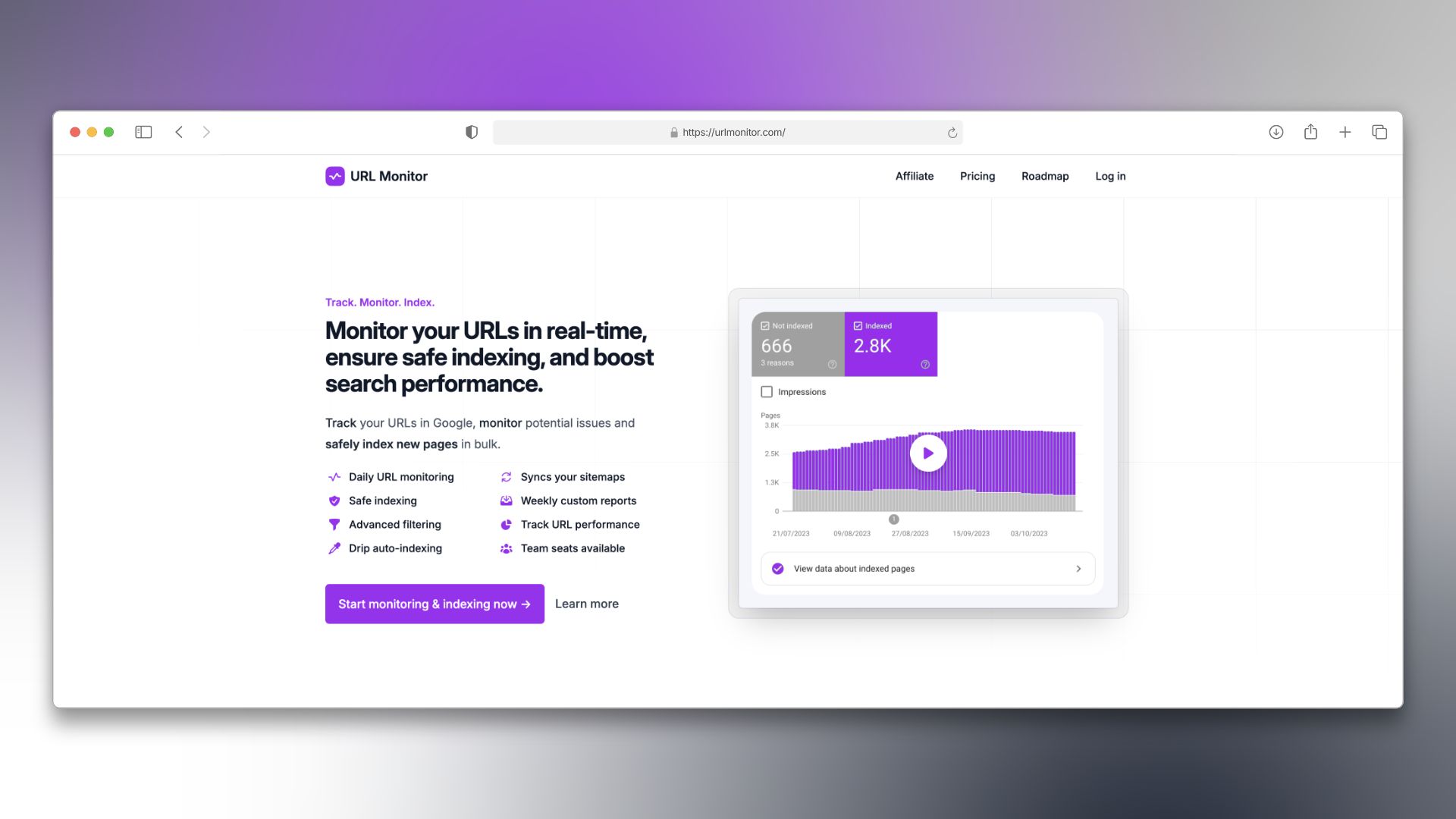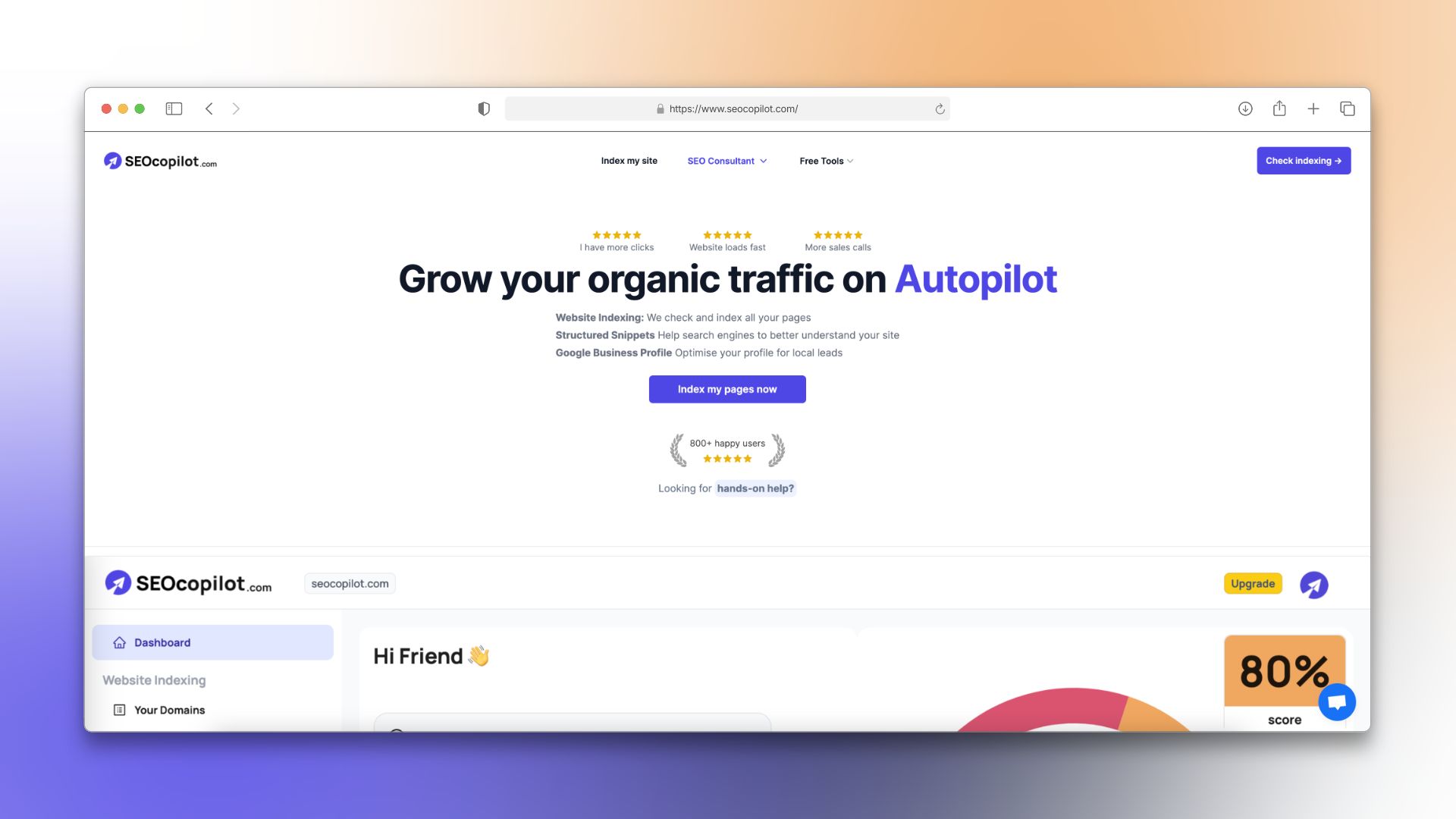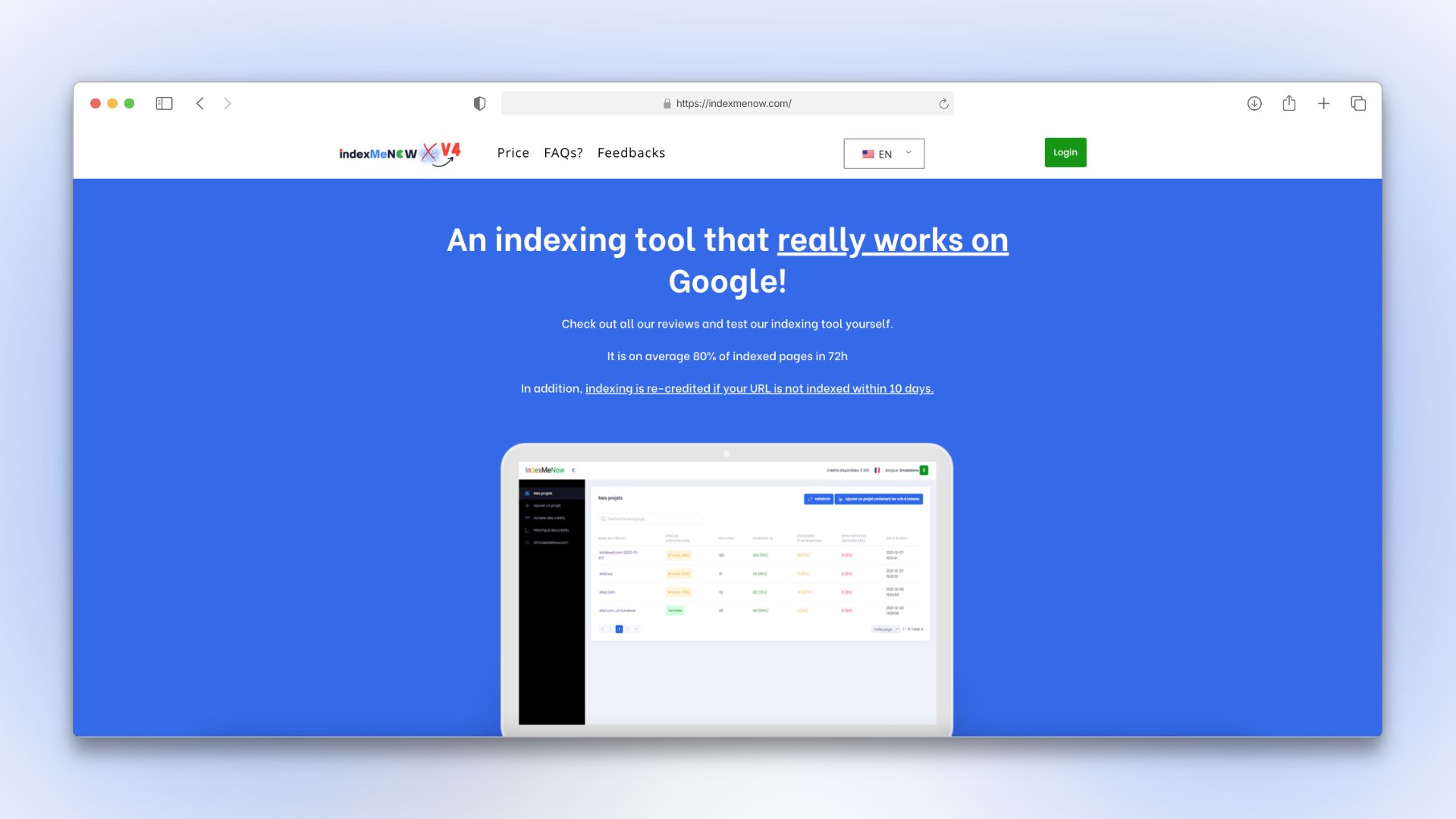When choosing a website indexer, consider factors like indexing speed, coverage options, search engine compatibility, and reporting features. These tools streamline your SEO strategy by enhancing site visibility and identifying potential indexing issues. Exploring these options further will reveal how they can optimise your website’s search engine performance.
1) URL Monitor

Streamlining your website’s indexing process, URL Monitor stands out as a top choice for busy webmasters and SEO professionals. This powerful tool offers real-time URL monitoring and smart indexing automation, ensuring your pages are promptly added to search engines. You’ll benefit from daily tracking of URLs for potential issues, bulk indexing of new pages, and automatic sitemap syncing to detect fresh content.
URL Monitor’s user-friendly dashboard displays indexing status and page health, with quick filter options for detailed analysis. You can manually add pages for indexing without sitemaps and use the bulk submission feature for multiple pages. The tool securely manages your data, fetching initial information for up to 2,000 URLs and continuously updating search analytics. With over 3,400 satisfied customers reporting significant time and cost savings, URL Monitor has proven its worth in improving indexing efficiency and boosting keyword rankings.
Best For: SEO professionals and webmasters seeking to automate and optimize their website indexing process while saving time and improving search engine visibility.
Pros:
- Offers real-time URL monitoring and smart indexing automation for efficient search engine inclusion
- User-friendly dashboard with quick filtering options and bulk submission features
- Proven track record of improving indexing efficiency and keyword rankings for over 3,400 customers
Cons:
- Limited to monitoring up to 2,000 URLs in the initial data fetch
- No refunds offered for subscriptions, which may deter some potential users
- Requires granting read-only access to Google Search Console data, which may concern privacy-conscious users
2) SEO Copilot

SEO Copilot is designed to ensure your website is always indexed.
Simply log in and connect your account, and SEO Copilot will analyse your Google Search Console data to check which of your pages are indexed. If you find any pages that aren’t indexed by Google yet, you can request indexing on your behalf.
You’ll love SEO Copilot for its ability to bulk index all your pages, so you won’t have to check each one individually.
Additionally, SEO Copilot helps you index your pages on other search engines through the IndexNow feature. They’ll guide you through linking your domain to IndexNow, which alerts search engines like Bing and Yandex about your pages. While these engines account for only 5-10% of total searches, it’s a quick win to boost your visibility across multiple platforms.
Best For: Website owners, SEO professionals, and digital marketers who want to ensure their web pages are properly indexed by search engines and maintain optimal online visibility.
Pros:
- Provides quick and easy methods to check indexation status of web pages
- Offers tools like SEO Copilot for automated indexing checks and bulk management
- Helps improve search visibility and organic traffic by identifying and resolving indexing issues
Cons:
- Some methods, like Google Search Console, require site verification for full access
3) IndexMeNow

Website owners seeking a powerful indexing solution will find their match in this innovative tool. With a simple three-click process, you can initiate indexing for unlimited projects. The system employs multiple methods, including Google Search Console and URL Inspection, to enhance indexing success. You’ll benefit from hourly status checks and automatic indexing attempts throughout the day.
This tool boasts impressive results, with 60% of URLs indexed within 24 hours and an 80% success rate within 72 hours. You’ll only pay for successfully indexed URLs, and automatic refunds are provided for non-indexed links after 10 days. The user-friendly interface allows easy tracking of indexing status, while Chrome and WordPress plugins offer convenient integration. To maximize your indexing chances, focus on quality backlinks and consider modifying META TITLE tags for better results.
Best For: Website owners and SEO professionals seeking an efficient, automated solution to improve Google indexing rates for their web pages.
Pros:
- High success rate with 80% of URLs indexed within 72 hours
- User-friendly interface with Chrome and WordPress plugins for easy integration
- Pay-per-success model with automatic refunds for non-indexed URLs
Cons:
- Not guaranteed to index all submitted URLs
- Requires careful selection of quality backlinks for best results
- May need additional strategies like content updates to maintain long-term indexation
4) SpeedyIndex
SpeedyIndex revolutionizes Google indexing for webmasters and digital marketers who need their content visible fast. This service enhances your website’s visibility in search results without requiring access to Google Search Console. The process involves four steps: task submission, initial report generation, resubmission, and final report. You’ll receive an initial indexing report after 72 hours, followed by automated re-indexing on the 6th day for any unindexed links. The final report, confirming indexing results, is provided on the 11th day. SpeedyIndex offers a user-friendly interface, real-time tracking, and detailed analytics on indexing performance. With competitive pricing starting at $0.005 per link and a high probability of successful indexing, it’s an efficient solution for accelerating your content’s appearance in search results.
Best For: Webmasters, digital marketers, and content creators who need rapid Google indexing for new or updated content to improve search visibility and organic traffic quickly.
Pros:
- Accelerates indexing process without requiring Google Search Console access
- Provides detailed reports and analytics on indexing performance
- Offers competitive pricing with a high probability of successful indexing
Cons:
- Initial indexing report takes 72 hours, which may be longer than some users prefer
- Unindexed links after the process only receive a 50% refund
- Reliance on external service for indexing may not suit those who prefer direct control through Google’s tools
Factors to Consider When Choosing Website Indexers
When choosing a website indexer, you’ll need to evaluate several key factors that can impact your site’s performance and visibility. These factors include the indexer’s speed and efficiency, coverage and scalability options, compatibility with major search engines, reporting and analytics features, and the overall user interface and usability. By assessing these aspects, you can select an indexer that best meets your specific needs and helps optimize your website’s search engine presence.
Indexing Speed and Efficiency
Selecting the right website indexer hinges heavily on its speed and efficiency. When evaluating indexers, you’ll want to take into account their average success rates and timeframes. Top-performing tools typically achieve an 80% indexing rate within 72 hours, with 60% of URLs indexed in the first 24 hours. This rapid turnaround is essential for ensuring your content becomes visible in search results quickly.
Efficient indexers don’t just submit your URLs once and forget about them. They perform automatic reindexing checks multiple times daily, increasing the chances of swift indexing. These tools often make several attempts to index each URL, recognizing that persistence is key to success. Many also provide initial reports within 72 hours, giving you insights into indexing status and potential issues like 404 errors.
When choosing an indexer, look for those that offer a clear timeline of their process, from task submission to final reporting. This transparency helps you manage expectations and track progress. Remember, the faster and more efficiently your content is indexed, the sooner it can start attracting organic traffic and improving your SEO performance.
Coverage and Scalability Options
Beyond speed and efficiency, coverage and scalability are key factors to weigh when choosing a website indexer. You’ll want to take into account the range of search engines the indexer covers. Some tools focus solely on Google, while others extend their reach across multiple platforms, greatly enhancing your site’s overall visibility. This broader coverage can be essential for maximizing your online presence.
Scalability is another critical aspect to evaluate. As your website grows and you add new content, you’ll need an indexer that can handle an increasing number of URLs. Look for tools that offer robust scalability options to accommodate your site’s expansion. Additionally, support for bulk indexing is a valuable feature, allowing you to efficiently manage large batches of URLs and streamline the indexing process.
When evaluating indexers, pay attention to the frequency of indexing checks they provide. More frequent checks guarantee timely updates and quicker visibility of new content in search results. Finally, review the data limits imposed by each tool, such as daily or monthly URL indexing caps, to make sure they align with your website’s traffic and content needs.
Compatibility With Search Engines
Compatibility with search engines stands as an essential factor when choosing a website indexer. You’ll want to select a tool that supports multiple search engines, including Google, Bing, and others. This broad compatibility guarantees your site’s visibility across various platforms, maximizing your reach and potential audience.
Look for indexers that integrate with Google Search Console, as this feature provides direct access to indexing status and potential issues related to Google’s processes. It’s vital to verify that the indexing service complies with search engine guidelines to avoid penalties or de-indexation due to non-compliant practices.
Choose tools offering various indexing methods, such as URL submission or sitemap integration. This flexibility allows you to cater to different indexing needs and preferences. Additionally, assess the tool’s ability to provide detailed analytics on indexing performance across search engines. This data enables you to make informed decisions and adjustments to your indexing strategy.
Reporting and Analytics Features
When evaluating website indexers, you’ll want to pay close attention to their reporting and analytics features. These tools should offer robust capabilities that provide deep insights into your site’s performance and indexing status.
Look for indexers that generate daily or weekly custom reports, allowing you to track URL performance and indexing progress over time. Advanced filtering options are essential, as they enable you to sort data based on indexing status, page health, or specific URL queries, enhancing your understanding of site performance.
A high-quality analytics dashboard should display real-time indexing status and page health, helping you quickly identify and address potential issues. Additionally, search analytics data, including traffic trends and keyword performance for the past 30 days, can offer valuable context for optimizing your indexing strategies.
Don’t overlook the importance of user-friendly export capabilities. The ability to easily share and analyze performance metrics through exportable reports and summaries facilitates informed decision-making. By choosing an indexer with thorough reporting and analytics features, you’ll be better equipped to monitor, analyze, and improve your site’s indexing performance, ultimately boosting your SEO efforts.
User Interface and Usability
The user interface and usability of a website indexer can make or break your experience with the tool. When choosing an indexer, prioritize those with user-friendly interfaces that allow for efficient navigation and quick access to key features. Look for intuitive designs that reduce the learning curve, enabling you to manage multiple URLs with ease, regardless of your technical skill level.
Customizable dashboards are a valuable asset, displaying relevant metrics and indexing status at a glance. This feature enhances your user experience and facilitates informed decision-making. Pay attention to the task creation process; the best indexers require minimal clicks to set up new indexing tasks, improving usability and encouraging frequent use.
Real-time tracking of indexing status is another essential aspect to keep in mind. This feature provides immediate feedback, allowing you to promptly address any potential indexing issues. By selecting an indexer with a well-designed interface and robust usability features, you’ll streamline your workflow and maximize the tool’s effectiveness. Remember, an indexer that’s easy to use will likely become an integral part of your SEO strategy, helping you boost your website’s visibility and performance.
Pricing Structure and Plans
Pricing structure and plans play an essential role in selecting the right website indexer for your needs. When reviewing options, you’ll encounter diverse pricing models, including pay-per-link, subscription-based, and usage-based billing. These structures can greatly impact your overall costs, especially if you’re indexing a large number of URLs.
Many indexers offer free trials or introductory discounts, allowing you to test their features before committing to a paid plan. This can be particularly helpful in evaluating the service’s effectiveness for your specific requirements. You’ll typically find both monthly and annual payment options, with annual subscriptions often providing cost savings compared to monthly billing.
Pay attention to refund policies, as they can vary between providers. Some offer automatic refunds for unindexed URLs after a specified period, while others may require manual requests. Competitive pricing generally starts around $0.005 per link, but remember that total costs can scale based on your indexing volume and frequency.
When comparing plans, consider your long-term needs and budget. Factor in potential growth and the scalability of each pricing structure to make sure you’re choosing an indexer that offers the best value for your investment.
Data Security and Privacy
In an era of increasing digital vulnerability, data security and privacy should be at the forefront of your considerations when choosing a website indexer. Opt for services that provide read-only access to your data, safeguarding your account from unauthorized changes. This vital feature guarantees that your information remains protected while still allowing the indexer to perform its fundamental functions.
When evaluating potential indexers, prioritize those that assure data storage security and confidentiality. Look for clear commitments to user data protection and robust security measures to prevent breaches. It is important to choose a service that doesn’t share your information with third parties, maintaining the integrity of your data.
Consider indexers that offer transparency in their data handling practices. They should provide clear guidelines on how they process and store user data. Additionally, verify that the service allows you to revoke access to your data at any time through your account settings. This feature gives you control over your personal information and the ability to protect it as needed. By carefully weighing these factors, you’ll be better equipped to select a website indexer that prioritizes your data security and privacy.